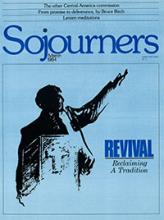Toni walked into my life on Good Friday. On a promise to her mother, I had spent six months trying to find this young woman I had never met. Just as I was giving up my fruitless search, she came out of the rain to ask for help.
I first met her mother in prison. Terrified to think of having to make it on her own with six children, Yolanda had stayed for 13 years with a husband who beat her. When he began to abuse the children, she took them and fled. Enraged, her husband and some of his buddies gang-raped Toni, his oldest daughter, while she was walking to church one Sunday morning. Toni was 14 then.
Yolanda was on the scene when one of the buddies was shot and killed a few days later. Yolanda's public defender encouraged her to plead guilty to manslaughter—despite testimony to the contrary—which carried a lighter sentence than the first-degree murder charge she was likely to get stung with. She was convicted as the person with the strongest motivation for carrying out the crime.
Like most women in prison, Yolanda's major preoccupation was her children. She was most worried about her oldest, who had suffered such trauma, and her youngest, Lisa—"because she was so young." Lisa was 9 when her mother was taken away.
Toni had spent weeks alone in the hospital after the rape, fearing she had been rejected and abandoned by her mother. Hospital personnel were afraid that telling Toni her mother was in prison would only add trauma to trauma.
I will never forget that Good Friday, the rain pouring down outside as we shared my lunch and Toni said softly, "My mother said you could help me. I'm going to have a baby."
My goddaughter was born seven months later on Thanksgiving Day. That was three and a half years ago.
Read the Full Article

